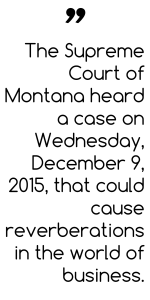There is an old adage about not being able to escape the “long arm of the law.” Well, Montana judges have to decide just how long this arm is in reality.
The Supreme Court of Montana heard a case on Wednesday, December 9, 2015, that could cause reverberations in the world of business. In general, corporations must have a viable presence in a state where someone files a lawsuit against them. The rules of civil procedure have always protected against outside litigation, ensuring that the accused have the ability to defend themselves. If able to file wherever they so choose, plaintiffs would “forum shop,” locating courts believed friendly to their cause, putting defendants in awkward positions.
 The Two SIdes
The Two SIdes
In this case, two employees of BNSF Railway have filed a legal claim against the company, despite serious questions about any connections to Montana. The two men, Brent Tyrrell and Robert Nelson, work for the Texas-based business. Neither railroad worker lives in Montana, nor did the alleged injuries occur within state lines. On its face, this case does not present the traditional fact pattern for a Montana court to accept jurisdiction.
The Legal Arguments For and Against
During the state Supreme Court testimony, attorneys for the workers put forth an argument that the Federal Employers’ Liability Act does allow courts to accept such cases, if a company operates within the state. Meanwhile, on the other side, legal representatives for BNSF countered that the highest tribunal in the land, the U.S. Supreme Court, just last year found that Daimler(Mercedes-Benz) did not have to face allegations of wrongdoing in California, despite having operations there, for actions committed in Argentina.
What Next?
Two prior rulings on this case have been inconclusive. On lower levels, Montana courts offered opposing opinions, one for the corporation, the other for the plaintiffs. It is now up to the state Supreme Court to put forth its decision.


